May 27, 2025 | 07:13 GMT +7
May 27, 2025 | 07:13 GMT +7
Hotline: 0913.378.918
May 27, 2025 | 07:13 GMT +7
Hotline: 0913.378.918
Mr. Do Nhat Tam is a relatively well-known farmer in Xuan Dinh commune, Xuan Loc district, Dong Nai province. Local residents can provide detailed directions to his greenhouse farm because Mr. Tam is an exemplary farmer and pioneer in the commune, with extensive investment in high-tech greenhouse production of cantaloupe, peppers, and vegetables.
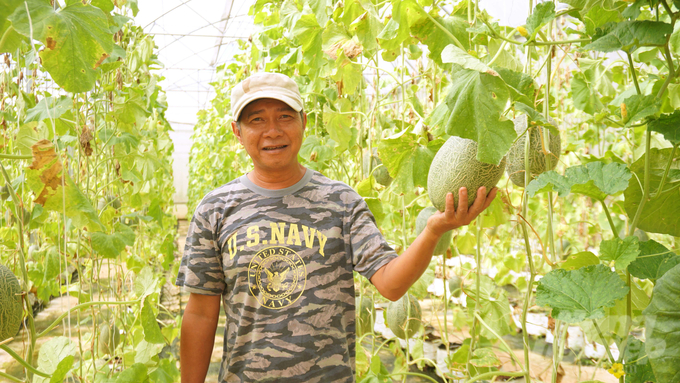
Thanks to his investments in modern greenhouses and net houses, Mr. Tam's farm provides high incomes and creates many job opportunities for local laborers. Photo: Le Binh.
Mr. Tam's high-tech greenhouses are located amidst numerous longan and durian farms in Xuan Dinh commune. He established ten greenhouses on an area of 1.5 hectares using agricultural techniques derived from Thailand and Israel.
Mr. Tam disclosed that he and his spouse once held stable positions in Ho Chi Minh City. However, after recognizing the potential for consistent growth of cantaloupe production in their hometown, they made the decision to return in 2011. Subsequently, they cleared their old longan farms to establish two 2,000-square-meter greenhouses. "I made a risky and substantial investment to construct these greenhouses with the aim of incorporating modern technologies," he shared.
Mr. Tam continually enhances the technical aspects and equipment employed in advanced cantaloupe production. Most notably, he transitioned from conventional ground planting to utilizing planting bags. Furthermore, he substituted manual irrigation and fertilization with a pressurized automated system to ensure precise dispensation of water and fertilizers across the farm.
We arrived at Tam Huong farm just as Mr. Tam, along with his team of workers, was diligently harvesting cantaloupes, peppers, and colorful vegetables. This is the daily routine for the labor force at Tam Huong farm to ensure timely delivery to wholesale markets every morning.
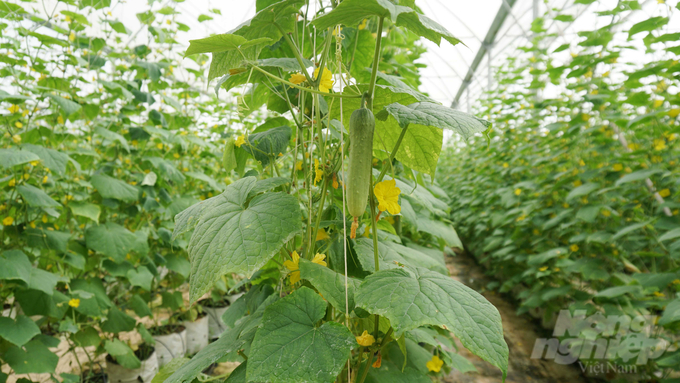
By adapting with flexibility and employing an intricate network of modern greenhouses and net-houses for the production of fruits and vegetables, Tam Huong farm contributes to providing a stable and locally sourced agricultural supply with high economic returns. Photo: Le Binh.
Mr. Tam dedicates 20 modern greenhouses to cantaloupe production during the dry season to meet domestic consumption demands. However, demand for cantaloupes tends to decrease in the rainy season, while the need for vegetables and other fruits rises. Consequently, Mr. Tam flexibly transitions to intercropping with peppers, bitter melons, cucumbers, and other crops. This adaptive approach stems from practical requirements and the involvement of the labor force at the farm.
The early rainy season coincides with the commencement of the fruit season in Southeastern Vietnam, which encompasses various fruits such as longans, durians, and mangosteens. As a result, the production of cantaloupe poses substantial market risks. Rainy season cantaloupes are often less sweet and susceptible to price drops, thereby significantly affecting profitability. Consequently, Mr. Tam allocates approximately 70% of the greenhouse area for vegetable and fruit production.
The vegetables and fruits produced by Tam Huong farm are procured directly on-site at competitive prices, including chili at 35,000 VND per kilogram, bitter melons at 10,000 VND per kilogram, cucumbers at 14,000 VND per kilogram, and corn at 12,000 VND per kilogram.
Ms. Tran Thi Tu Oanh, Deputy Director of the Dong Nai province's Sub-Department of Crop Production and Plant Protection - Irrigation, commends the flexibility demonstrated by Mr. Tam and his wife. Their adaptability to weather conditions not only ensures a stable supply of agricultural products for local markets but also generates a high economic return.
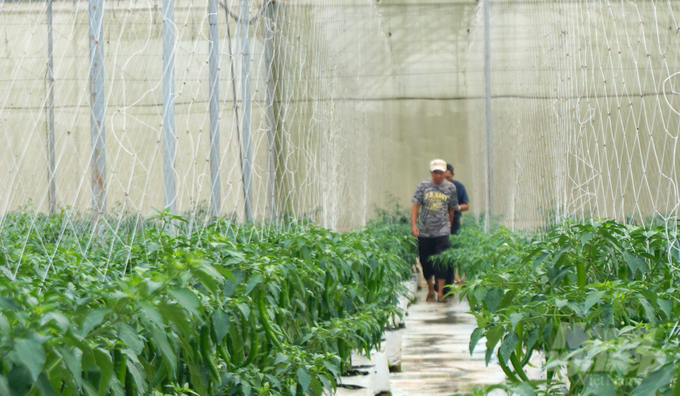
In just under a month, Mr. Tam's chili farn will commence the harvesting stage with plans for export to South Korea. Photo: Le Binh.
Tam Huong farm employs an automated drip irrigation system and moisture-sensing sensors in each greenhouse. When the humidity levels in the environment fall below the required threshold, the sensors trigger the automatic irrigation system by sending a signal to the central server.
Tam Huong farm also adheres to organic farming practices by refraining from using foliar fertilizers and chemical agents. Although they employ biological agents to prevent pests and diseases, Mr. Tam strictly adheres to the quarantine regulations. Moreover, harvested products must undergo routine sample testing to ensure they meet safety standards.
As a result, the cantaloupes bearing the Tam Huong brand are exported to many markets around the world including Japan, the United Arab Emirates, and fruit supermarket chains in Ho Chi Minh City. Income from cantaloupe production ranges from approximately 1.2 to 1.5 billion VND per year.
Translated by Nguyen Hai Long
![Advanced mariculture – an inevitable trend: [4] Accompanied by scientists](https://t.ex-cdn.com/nongnghiepmoitruong.vn/608w/files/sohk/2025/05/13/1941-pgsts-vo-van-nha-140958_717.jpg)
(VAN) According to Assoc. Prof. Dr. Vo Van Nha, Director of the RIA III, the development of advanced offshore mariculture is no longer an option but an essential path for Vietnam’s fisheries sector.

(VAN) Vietnam is intensifying the development of mollusk farming areas that meet international standards, aiming for sustainable growth and enhancing its export position in the global seafood market.
![Advanced mariculture – an inevitable trend: [3] Policy-driven momentum](https://t.ex-cdn.com/nongnghiepmoitruong.vn/608w/files/doanhtq/2025/05/21/0104-0616-0348-nuoi-bien-170339_789.jpg)
(VAN) To ensure the success of offshore mariculture that uses advanced technologies, it is essential to establish supportive policies that inspire both individuals and enterprises to invest with confidence.
![Advanced mariculture – an inevitable trend: [2] Outstanding results](https://t.ex-cdn.com/nongnghiepmoitruong.vn/608w/files/sohk/2025/05/12/4632-4136-nuoi-bien-11-164117_819.jpg)
(VAN) Pilot models of high-tech offshore mariculture in Vietnam, particularly in the South Central Coast region, have demonstrated exceptional economic returns and sustainability, setting a new direction for the country’s aquaculture industry.
![Advanced mariculture – an inevitable trend: [1] Moving offshore](https://t.ex-cdn.com/nongnghiepmoitruong.vn/608w/files/phucpm/2025/05/18/0252-2436-nuoi-bien-6-162148_783.jpg)
(VAN) Mariculture using advanced technology and moving offshore is an inevitable trend, as nearshore areas increasingly reveal limitations.
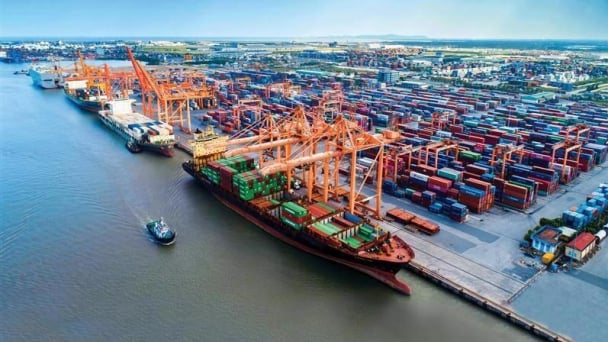
(VAN) South Korea is currently the second-largest investor in Hai Phong in terms of the number of projects (186 projects) and the largest in terms of total registered investment capital, reaching USD 14.2 billion.
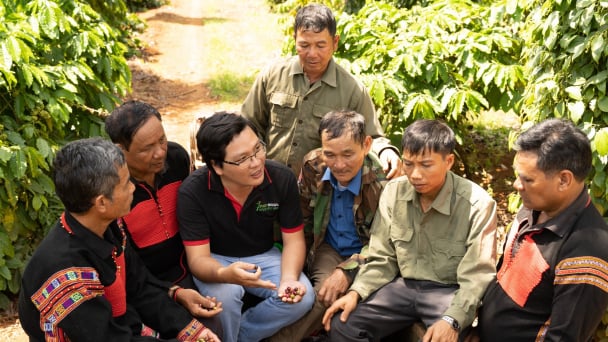
(VAN) As consumers become more environmentally conscious, legal regulations grow increasingly stringent...